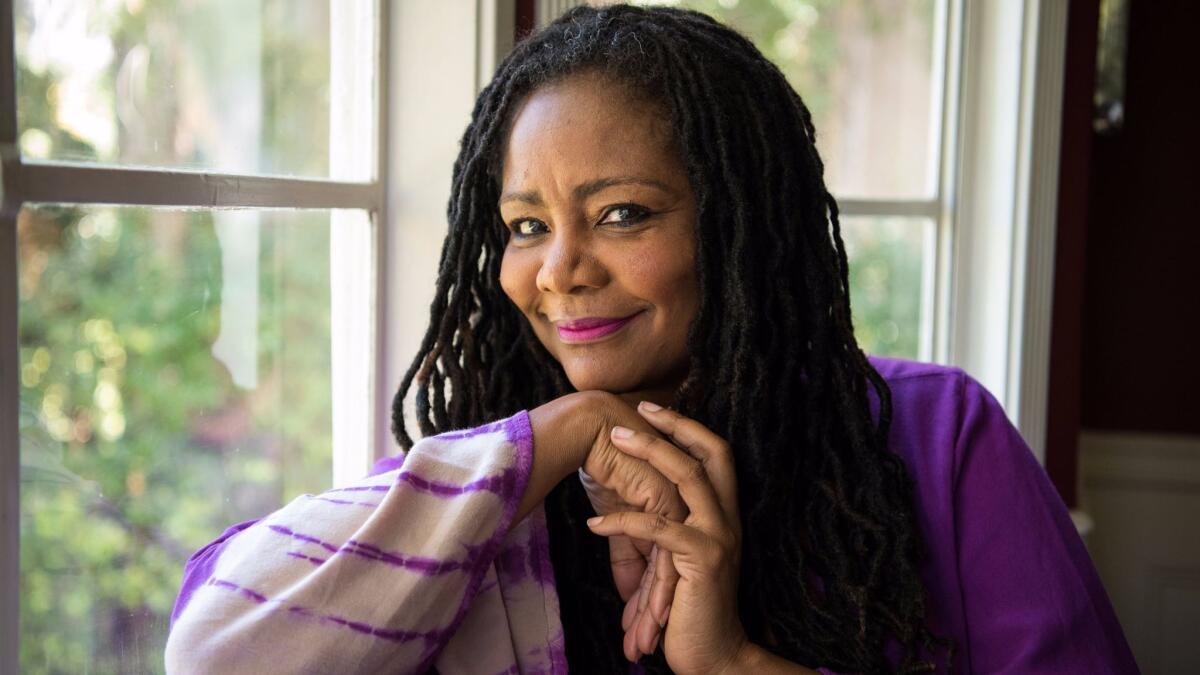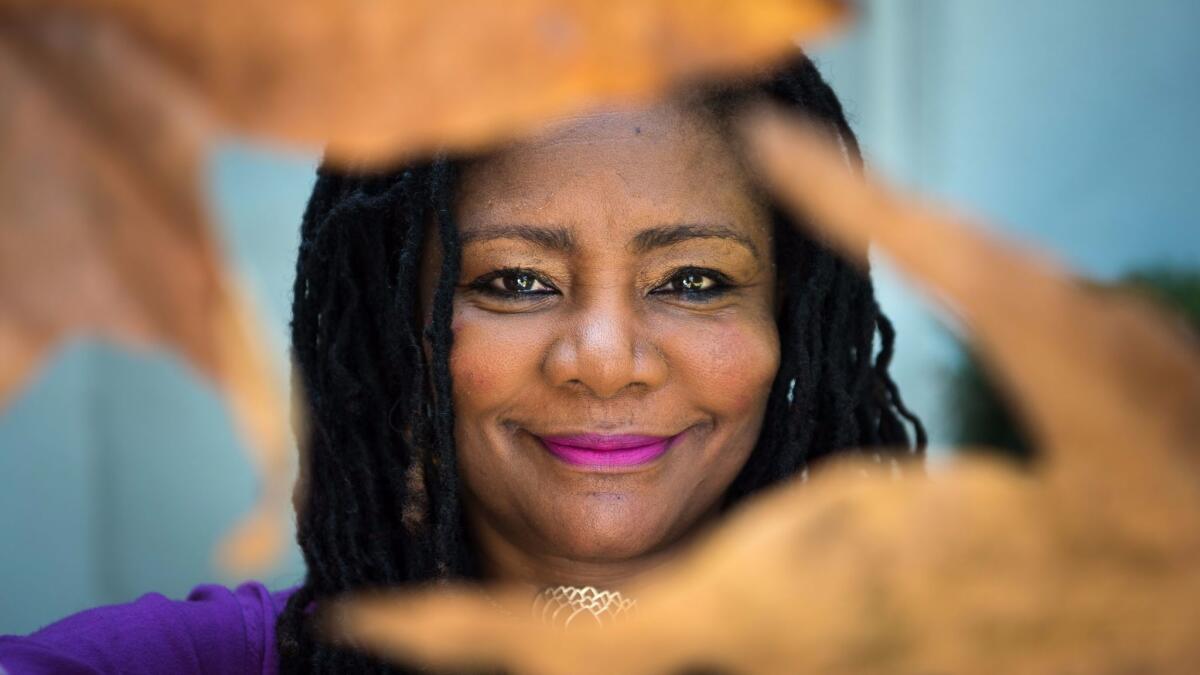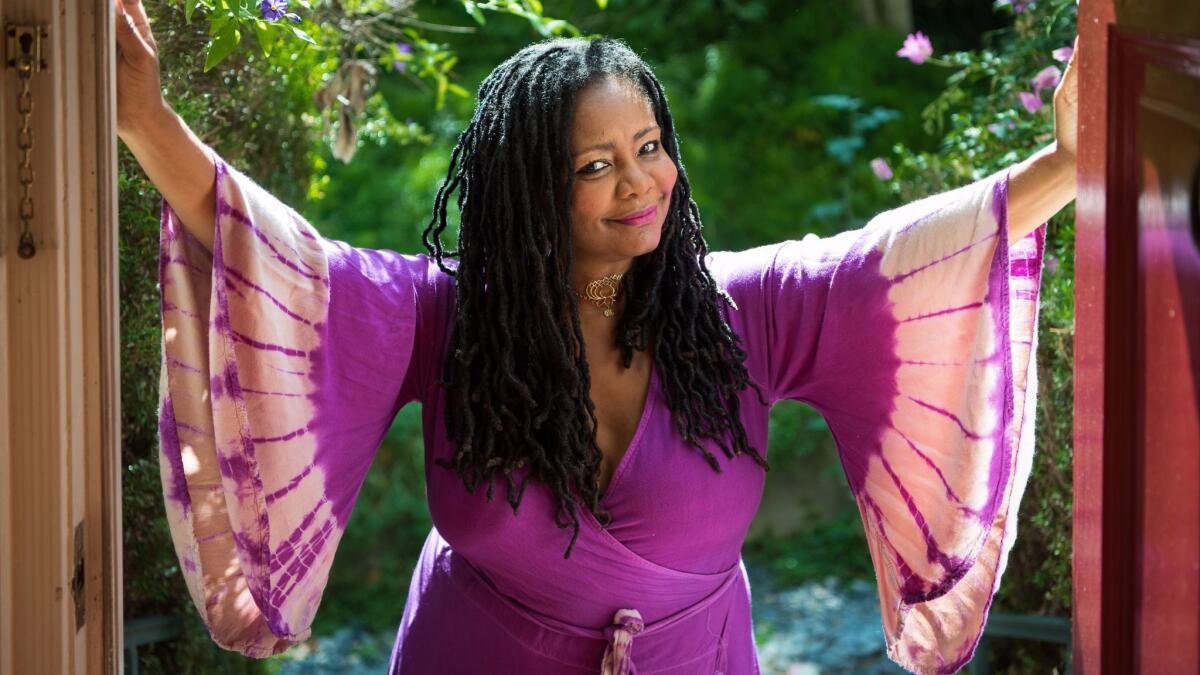Tonya Pinkins: A story of gun violence and a mother’s loss brings this Tony winner back to the stage

- Share via
The old Hollywood adage that directing is 90% casting holds just as true in the theater, especially with a new play: Those first performances can turn heads, build buzz, entice other theaters to give the script a spin — or not.
So when Bart DeLorenzo agreed to direct the world premiere of Alessandro Camon’s “Time Alone” at the Los Angeles Theatre Center, he knew he needed to find the perfect Anna, a middle-age Texas woman mourning her son, a police officer slain in the line of duty. Anna is lonely and miserable and furious, and her only real goal for the rest of her life — the one hope that keeps her from suicide — is to watch the execution of her son’s killer.
“Our casting director had a long list of really exciting, famous people for the part,” DeLorenzo recalls during a pre-show chat one night at the LATC. “But I felt it was really important to have a real theater artist. It’s immensely challenging, this piece — the depth that the character has to go, and also to maintain our interest through monologues.”
DeLorenzo thought the role would be difficult for a great film or television actress if she weren’t steeped in theater. “So I was thinking about different people, and then I was having my taco over at Guisados with Alessandro, the playwright, and I thought, ‘You know who would be great? She’d never do it. But you know who would be great would be Tonya Pinkins.’”
Well, yes, Camon agreed. Obviously. Pinkins, who won a Tony for “Jelly’s Last Jam” in 1992 and originated the lead in Tony Kushner’s 2003 Broadway musical “Caroline, or Change,” would be an awesome Anna. World peace also would be cool.
“Yeah, she’d never do it,” De Lorenzo said regretfully.

But after lunch, he called his close friend Annabelle Gurwitch, also a friend of Pinkins’.
“Do you think she would do anything like this?” De Lorenzo asked Gurwitch.
“I don’t know,” she said. “Maybe. Why not ask?”
Cut to another day in a restaurant in Silver Lake at lunchtime, where Pinkins — spoiler alert, she said yes — takes up the story. She’s wearing an ankle-length dress of brilliant purple and lipstick in the same shade as she orders hot water with lemon and a seared tuna salad.
“I got an email from my friend Annabelle about this play before my manager sent me the offer,” she recalls. “Like, the same day. And I thought to myself, ‘Hmmm, do I want to do a play?’ I hadn’t done a play in a couple of years.”
She could think of at least three arguments against it.
The first was money. Pinkins had been working mostly in TV, including playing the creepy doctor Ethel Peabody on “Gotham.” She was enjoying it. And as much as she would have loved do to a play, “you could make that much money in two days on a TV series,” she says. “So you’re always having to think, ‘I would have to really, really love this to give up even the opportunity to make as much money in such a short amount of time.’ And that, in this point in my life, is always a consideration.”
Gurwitch offered that Pinkins could stay at her place in L.A. The two women met when they were 15 at Northwestern University’s summer theater program.
“Annabelle tells me Steve Carell was also there,” Pinkins says. “But we didn’t know him. I’m like, ‘Damn, why didn’t we know him?’ There were only about 25 of us. He must have been a real dweeb, because we didn’t pay him any attention,” she adds with an infectious chuckle.
A place to stay couldn’t answer Pinkins’ second argument, which was: Did she really need the stress?
“The last two or three theater things I had done were really traumatizing for me,” she says. She has been originating roles in new plays for 40 years and is accustomed to collaborating with writers and directors in shaping her roles. “I feel really comfortable talking with a writer about my perspective inside of it as the actor,’ she says. “Like, ‘This doesn’t feel good in my mouth,’ or ‘I think I could show you this and I don’t have to say it. Listen to this. What do you think?’”
I’m comfortable in being powerful and being assertive, and there are certain rooms where that’s not OK.
— Actress Tonya Pinkins
In at least the last two plays she joined, “Rasheeda Speaking” and “Mother Courage and Her Children,” Pinkins says, she and the creators didn’t see eye to eye about her characters. The experiences didn’t feel like just aesthetic disagreements but, as she puts it, like “a bunch of white people denying [my] reality of what it is to be a black person.” At the end of 2015, she made headlines when she dropped out of the Classic Stage Company production of Brecht’s “Mother Courage and Her Children” during previews. The show went on, with Kecia Lewis in the lead.
Pinkins released a statement saying that her role had been “neutered” by “the filter of the white gaze.” Some of the press coverage hinted that Pinkins had overreacted or that she was “difficult” to work with.
She says she’s gotten about six play offers since — and turned them all down.
When she was deciding on “Time Alone,” she says, “I had to go, ‘OK, are you ready to go back in the room again?’ And once again being the only woman in a room full of men, and what that’s like. And I’m a very comfortable woman. I’m comfortable in being powerful and being assertive, and there are certain rooms where that’s not OK.”
Gurwitch had worked with DeLorenzo — he directed a stage adaptation of her book “I See You Made an Effort” at the Skylight Theatre in 2015 — and could assure Pinkins that his room wouldn’t be that kind of room. Pinkins also talked with Camon, who had been inspired to write “Time Alone” by his experiences teaching writing in correctional institutions, and although he is an advocate of prison reform, he wanted the play to explore a range of views.
“I appreciated his humility about writing this character,” Pinkins says. “He told me, ‘I wrote Anna as a white woman, because I thought I could write a white woman, and I don’t know that I could write a black woman. Do I have to change it to write a black woman?’ And I said, ‘Well, you wrote about grief, which is universal and doesn’t really have a color, so I don’t think there’s anything you need to change for me to play it.’”
“Time Alone” is a two-hander, and the other character is Gabriel (Alex Hernandez), a convicted murderer serving a life sentence in solitary confinement. He tells his story to the audience in a series of monologues interspersed with Anna’s that reveal the darkness of prison life.
“There is a lot of humor in the play,” DeLorenzo says. “It’s beautifully written, but, yeah, it’s intense.” The effectiveness of the work as a whole, though, hinges on the audience’s willingness to spend time with both characters.”
I don’t know what ‘acting’ means. This is all I have to work with, my body and my experiences, and that’s what you’re going to see.
— Tonya Pinkins
Which brings us to Pinkins’ third argument: Did she want to go there? Pinkins hasn’t been the sort of actress to pay lip service to a character’s pain.
“I’m the character,” she says. “I don’t know what ‘acting’ means. This is all I have to work with, my body and my experiences, and that’s what you’re going to see: these words as interpreted through this body and in the light of me. It’s deeply, deeply personal for me, and I’ve got to go through it every day. The body doesn’t know that it’s imaginary.”
So when she started reading the script, her first thought was, “Whoa, this is really dark.” She has four children, ranging from 18 to 30. “And as a parent, it’s like, ‘Uh, do I want to inhabit that? I’m already feeling raggedy, and do I want to add some more raggedy on there?’ So I had to think on that.”
But in the end, her choice didn’t involve thinking at all.
“At that point in time, I was conducting these women’s circles, where women connect with women across the generations to reconnect to our sacred feminine self and where our real power is, and it’s not here,“ she says, pointing to her head. “And that’s what comes out across all our meetings, is that when anyone can get us to go here [the head] first, we’re not going to make a decision that’s in our best interest. So we were really focusing on just, ‘Let’s ask our bodies,’ and my body’s like, ‘I think I’m supposed to go to L.A.’ And my agent was like, ‘Well, you know you’re up for these three series,’ and I was like, ‘I don’t think that’s going to happen. I’m supposed to go to L.A.’ Something instinctively said, ‘This is where you need to be right now.’”
If this process sounds out there or New Age-y, Pinkins in person describes it with such low-key, matter-of-fact conviction that it makes perfect sense. She’s not only exceptionally glamorous — she says she’s never been the type of performer who likes to be looked at, but it’s hard to look anywhere else — but she also exudes an aura of trustworthiness and warmth that makes people want to confide in her.
At this point, the waiter sets down a seared-tuna sandwich in front of her. “Oh, I thought this was a salad!” she exclaims. Everybody freezes — waiter, publicist, reporter alike. Is this when we’re going to meet the storied Broadway diva? Pinkins takes a breath. “It’s OK,” she says, setting the top slices of bread to the side. The waiter hurries away, and the show goes on.
De Lorenzo said he’d heard about Pinkins’ disagreements with previous directors but he wasn’t nervous about working with her.
“I’ve worked with a lot of opinionated, strong-willed performers, and I actually like that,” he said. “She had some strong ideas right at the beginning, and I thought they were great, and I’ve just tried to support her thoughts.
“I suppose if she’d had an idea that I thought was terribly wrong and we’d had a huge fight about it,” he adds contemplatively, “I might feel differently. But that wasn’t my experience. Tonya’s really smart, and her mind works faster than anybody’s I’ve ever seen. She’s really quick with everything. She’s quick with her thoughts and quick with her feelings, and I just kind of hang on for the ride. She’s a force of nature in the best way. I’m not sure what this show would be without her.”

♦ ♦ ♦ ♦ ♦ ♦ ♦ ♦ ♦ ♦
‘Time Alone’
Where: Los Angeles Theatre Center, Theatre 2, 514 S. Spring St., Los Angeles
When: 8 p.m. Friday, 5 p.m. Sunday, 7:30 p.m. Monday, 8 p.m. Oct. 26-28, 3 p.m. Oct. 29
Price: $30-$55
Info: (213) 489-0994, www.bellerevetheatre.com
Running time: 1 hour, 30 minutes
Support coverage of the arts. Share this article.
MORE GOOD READS:
Broadway star Carmen Cusack finds her place in L.A.
Joe Morton, ‘Turn Me Loose’ and the sly comic activism of Dick Gregory
Hollywood & Highland censors sculpture in response to Weinstein scandal
More to Read
The biggest entertainment stories
Get our big stories about Hollywood, film, television, music, arts, culture and more right in your inbox as soon as they publish.
You may occasionally receive promotional content from the Los Angeles Times.










